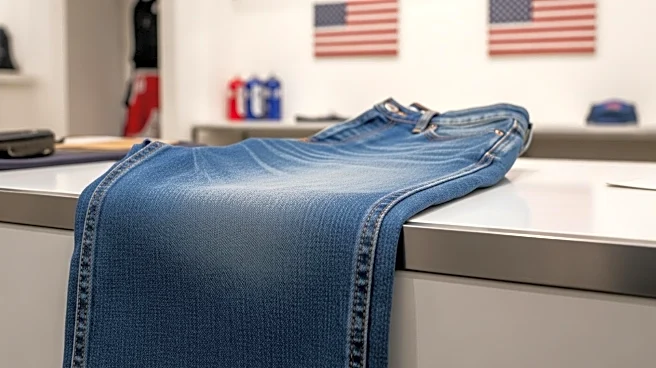What is the story about?
What's Happening?
Levi Strauss & Co. has reported a 7% increase in net sales for the third quarter, reaching $1.5 billion. The company, led by CEO Michelle Gass, is considering doubling its store count in the U.S., where it currently operates nearly 460 stores. This expansion is part of Levi's strategy to capitalize on the global popularity of denim and its strong market position in both men's and women's apparel. The company's direct-to-consumer sales rose by 11%, while wholesale sales increased by 3%. Despite facing tariffs, Levi's gross margin expanded by 110 basis points to 61.7%. The brand's longevity and consumer trust are seen as assets during uncertain times, contributing to its optimistic outlook for the fourth quarter.
Why It's Important?
Levi's potential expansion of its U.S. store count signifies a strategic move to strengthen its retail presence and leverage its market leadership in denim. This decision could impact the retail landscape by increasing competition with other apparel brands like American Eagle and Zara, which are known for dynamic store experiences. The expansion may also influence consumer shopping habits, as Levi's aims to enhance its direct-to-consumer sales. However, the company faces challenges in retail execution and managing expenses, which could affect its profitability and operational efficiency. Analysts have expressed concerns about Levi's ability to scale expenses, highlighting the need for effective cost management to maintain margins.
What's Next?
Levi's plans to open four new Beyond Yoga stores in Boston, Houston, and Northern California by the fourth quarter, increasing its store count to 14. The company is optimistic about maintaining business momentum but remains cautious due to potential tariff impacts and consumer demand fluctuations. Analysts have noted Levi's conservative outlook for the fourth quarter, partly due to last year's extra week boosting revenue. The company aims to address retail execution challenges and improve store experiences to compete with rivals. Levi's executives are focused on transitioning to a direct-to-consumer model, which involves managing executive compensation and related expenses.
Beyond the Headlines
Levi's expansion plans reflect broader trends in the retail industry, where brands are increasingly focusing on direct-to-consumer strategies to enhance customer engagement and brand loyalty. The company's efforts to improve retail execution and store experiences may lead to innovations in store design and customer service. Additionally, Levi's commitment to maintaining its market leadership in denim highlights the enduring appeal of this fashion staple, which continues to drive sales across various demographics. The company's ability to navigate economic uncertainties and adapt to changing consumer preferences will be crucial for its long-term success.
















